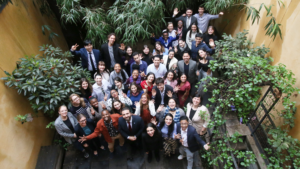Pope St. John Paul II proposed to do two things in his encyclical letter Centesimus Annus (on the hundredth anniversary of Pope Leo XIII’s encyclical Rerum Novarum [of new things]): look back at the earlier document “itself in order to discover anew the richness of the fundamental principles which it formulated for dealing with the question of the condition of workers” and “look around at the new things which surround us and in which we find ourselves caught up, very different from the new things which characterized the final decade of the [19th] century” (3).
Many difficulties Leo XIII identified as (relatively) new in 1891 are now regular parts of our common life, including high rates of production determined by efficiency and profit. “The good of the individual is completely subordinated to the functioning of the socio-economic mechanism,” leaving “the individual person simply as an element, a molecule within the social organism,” and as a result, “the concept of the person as the autonomous subject of moral decision disappears, the very subject whose decisions build the social order” (13). Here the relationship between the state and social mechanisms, on one hand, and the person, on the other, becomes clear—the former should exist for the sake of the latter. John Paul II teaches that if the defects of modern life have been institutionalized, the remedies must also be institutionalized, so “the State has the duty of watching over the common good and of ensuring that every sector of social life, not excluding the economic one, contributes to achieving that good, while respecting the rightful autonomy of each sector.” There are, also, “necessary limits to the State’s intervention and on its instrumental character, inasmuch as the individual, the family and society are prior to the State, and inasmuch as the State exists in order to protect their rights and not stifle them” (11).
The particular problems that Leo XIII and John Paul II identify, and their remedies, will vary over time, but the underlying principle of solidarity is invariant: the more defenseless individuals are, the more they are owed the care and concern of others, and even government intervention. This is true in both the domestic and international orders, and fundamental to social and political organization.
This principle is frequently stated by Pope Leo XIII, who uses the term “friendship”, a concept already found in Greek philosophy. Pope Pius XI refers to it with the equally meaningful term “social charity.” Pope Paul VI, expanding the concept to cover the many modern aspects of the social question, speaks of a “civilization of love” (10).
Valuing solidarity over efficiency requires an understanding of “the essential bond between human freedom and truth, so that freedom which refused to be bound to the truth would fall into arbitrariness…a kind of freedom which, in the area of economic and social activity, cuts itself off from the truth about man” (4). In the light of solidarity, “man’s principal resource is man himself” and “his intelligence enables him to discover the earth’s productive potential and the many different ways in which human needs can be satisfied” (32). “It is this disciplined work in close collaboration with others” that enables transformation and develops virtue (32). This disciplined work is occurring. John Paul II points out an important new thing by which people are exercising virtue to transform the human environment:
the fruitful activity of many millions of people, who, spurred on by the social Magisterium, have sought to make that teaching the inspiration for their involvement in the world. Acting either as individuals or joined together in various groups, associations and organizations, these people represent a great movement for the defense of the human person and the safeguarding of human dignity. Amid changing historical circumstances, this movement has contributed to the building up of a more just society or at least to the curbing of injustice (3).
WYA is a leading example of the activity oriented to the buildup of a just society. In its work at the UN and in developing the FEMM and Human Dignity Curriculum (HDC) curricula, WYA helps to curb unjust impositions that deny the dignity of the human person, and ensure that international consensus reflects the reality of the human person. It encourages both governments and individuals to support and defend the most defenseless among us. The Track A training includes the text of Centesimus Annus to further explain this vision for the defense of the human person, and many other readings which illustrate avenues for carrying out “the building up of a more just society.” John Paul II teaches that “the good of the individual [cannot] be realized without reference to his free choice, to the unique and exclusive responsibility which he exercises in the face of good or evil” (13), and that choice is yours.
Brother Thomas-Martin Miller is an intern with the World Youth Alliance.
Like what you’re reading? Be sure to follow us on Facebook, where you can catch all our WYA Blog content including book reviews such as this one.
For even more information on books we love, check out our Recommended Books List or let us know if you’d like to join a WYA discussion group.
Featured photo by R~P~M on Flickr.







